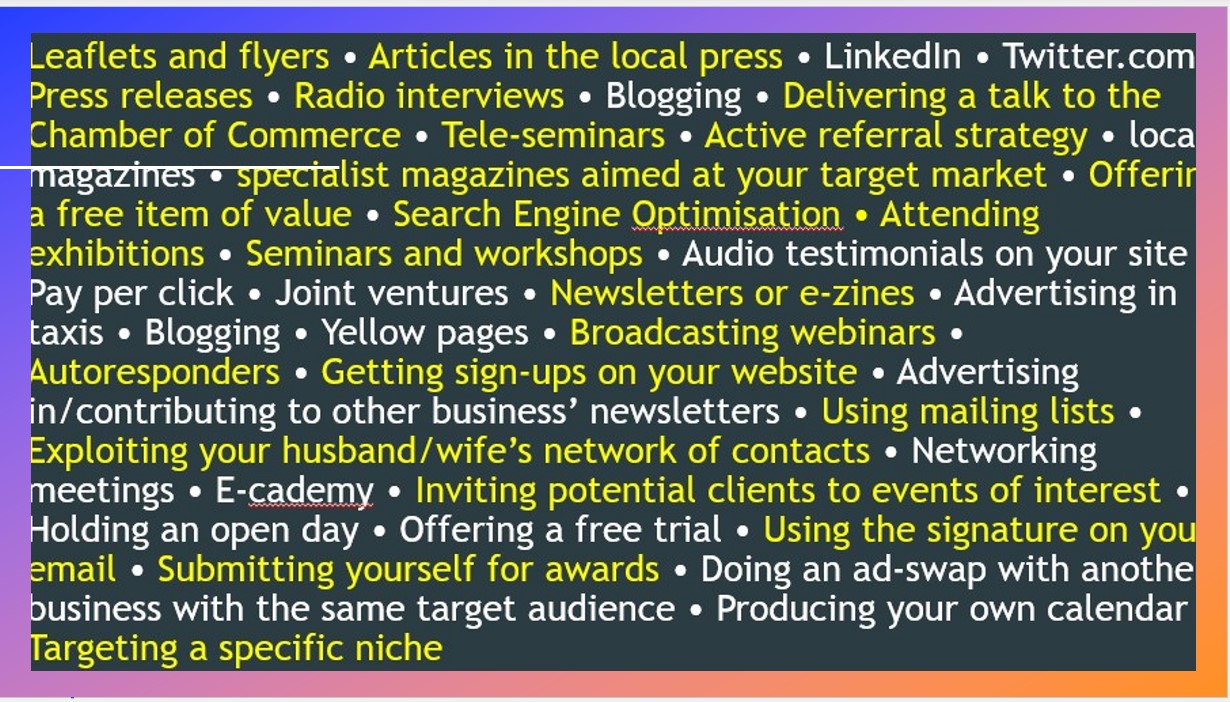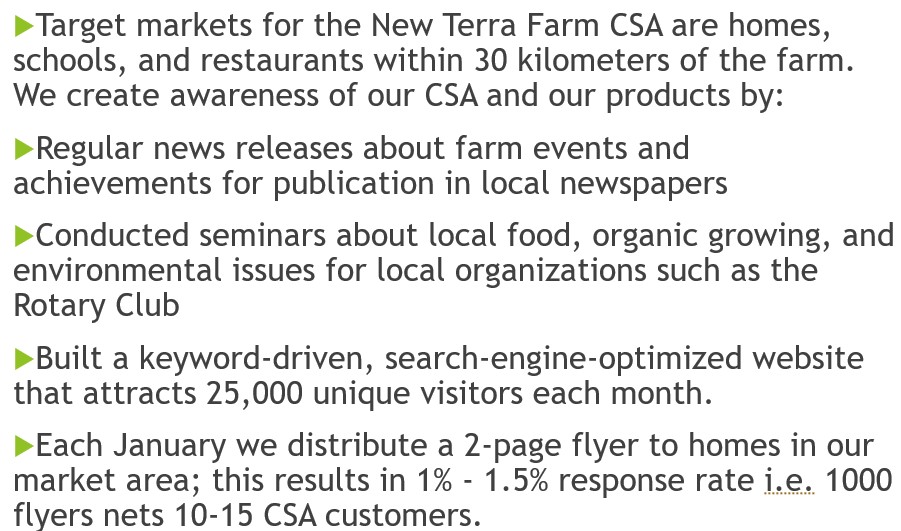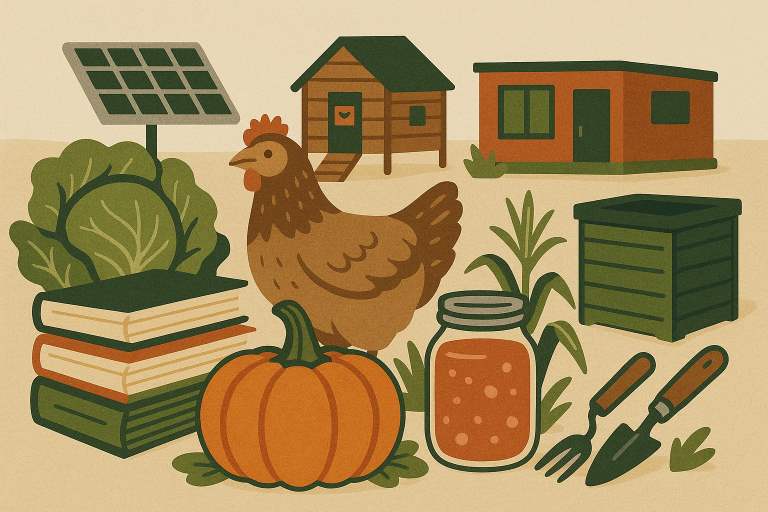Your Small Farm Marketing Plan
 The New Terra Farm Small Farm Marketing Plan included all the media highlighted in yellow
The New Terra Farm Small Farm Marketing Plan included all the media highlighted in yellowMarketing guru Seth Godin said "Everybody is not your customer".
In a previous article about marketing your small farm, I wrote about the importance of crafting a powerful, consistent message that conveys who you are and what you do, and why that makes you a good person to do business with.
I used the phrase 'markets, mindsets and messages', and showed that gaining the right mindset to create the right messages for your market started with Vision.
This approach will resonate with the people you want to have as customers.
This article takes the next step; i.e. once you have those compelling messages, how do you get them in front of your potential customers?
Look at that top graphic; at one time or another I used ALL the methods shown in yellow to attract customers (Don't panic, I didn't use them all at once!)
But every one of those media and methods had a single goal: Get people to visit New-Terra-Farm.com!
So, let's talk about why I did that, and why you need a website.
Your Website is the Base of Your Small Farm Marketing Plan
Here's the thing: social media is all well and good, but you don't OWN Twitter (now 'X'), or Facebook, or Instagram. And you don't own their traffic i.e. visitors.
On the other hand, I do own New-Terra-Farm.com (and New-Terra-Natural-Foods.com, and TNT-Buds, and Gardening-For-Results and a few more). You can check out my review of the website builder I use here.
When someone visits my site I have the opportunity to capture their email (all double-opt-in, nothing shady). and then I can sell them my stuff in subsequent contacts over time.
I mentioned before that (as of December 2023) I get an average of 840 unique visitors a day to my website.
Some of those people download one of my free reports, and give me permission to contact them in return - take a look at the form below for an example.
And subsequently, some of those people become customers.
The New Terra Farm Marketing Plan
Every project, including a small farm marketing plan, needs an approach, a timeline and a budget. You need to have identified your target market, your marketing mix and (like we talked about) your compelling messages.
Here's what we did when our marketing approach was fully fleshed out:

If you search on ‘natural and organic food Ontario’ in the major search engines you will usually find New Terra Farm on the first page of results. I spent quite a bit of time learning how to make that so.
Because some of those people who found my website will become my customer. And anybody can learn to do that.
Local papers are always looking for content, and news about your farm is content. People will skip over ads, but will read information about a local grower doing something new or unusual.
Community groups are always looking for speakers; both these approaches are free by the way.
The website and flyers will cost some money, but in my experience they are two of the best ways to get the word out about your business.
The SEO website costs me $39/month and generates many times over that in sales.
The first flyer mail-out I ever did cost me $300 for printing and postage. My return on that was more than $13,000 in sales.
Whew! Seems Like a Lot of Work!
This might seem like a big task, and will undoubtedly cost some money, but consider this: I have had customers that bought over $2,000 worth of products from me in a single season. My friend Angie who runs a whole farm CSA sells $5K-$6K worth of goodies to each family that patronizes her farm.
So let’s say that potentially I could keep that customer for 5 seasons (and I have done that with lots of customers). That’s $10,000 in gross sales, maybe $4,000 in my pocket.
How much money and effort is it worth to acquire that customer (and keep them happy)?
Plan YOUR Small Farm Marketing Plan
Carefully Curated Resources For The Homesteader and Prudent Property Owner
The world seems to be a little unsettled these days. I'm always looking for ways to make New Terra Farm more self-sufficient and productive.
Here's a few of the best ways I've found to make self-sufficiency happen. Useful Homesteader Resources
I mentioned you will need an approach, a timeline and a budget. Your answers to the following questions are key:
1. What is
your message: What do you want your customers to know about your products? (see previous article for some suggestions).
2. Marketing Mediums and Delivery: What tools and methods will you use to
communicate your message? (extensive list of possibilities in the top graphic).
3. Personnel: Who will be primarily responsible for marketing and customer communications?
4. Timing: When and how often will you contact your customers via promotions and communications?
5. Costs: How much will your promotions and communication cost?
6. Return on Investment: How will you track which promotions are working for you?
By the way, my answer to Question 3 is 'me'. This is one of the tasks I DON'T delegate. I believe that acquiring customers and keeping them happy is too important to leave to someone else. YMMV.
Speaking About Small Farm Marketing...
In addition to my web writing, books, and courses, I'm also a speaker about topics relevant to the local food movement and the business of small farms.
If you would like to explore the possibilities for a training seminar or keynote at your organization, contact me though my Speaker's Page. I look forward to speaking with you.
- Home
- Market Gardening
- Small Farm Marketing Plan
Recent Articles
-
New Terra Farm market gardening book shows you success step-by-step
Feb 07, 26 11:42 AM
Start-up, market and manage a successful organic market garden with my Bootstrap Market Gardening Book -
Farm training for the new or wannabe farmer
Jan 02, 26 10:38 AM
Practical farm training from award-winning New Terra Farm -
Farm grown reviews of products recommended by New Terra Farm
Dec 04, 25 06:26 AM
Find great farm and garden products in my farm grown reviews







